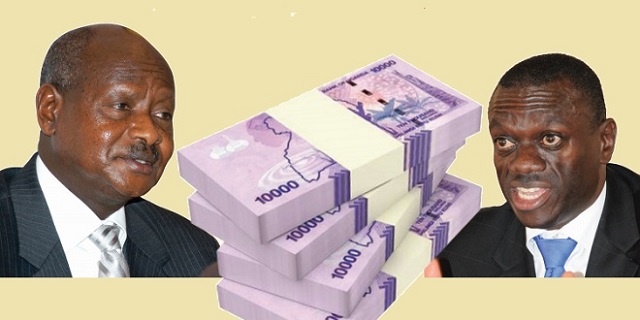
Museveni, MPs plot less money in next election
Kampala, Uganda | THE INDEPENDENT | President Yoweri Museveni’s ruling NRM party spent Shs13 billion on the 996 national election, Shs30 billion in 2001, Shs50 billion in 2006 billion and Shs75 billion in 2011. In the 2016 elections, some estimates indicate, the ruling party spent Shs121 billion.
Going by these estimates, the NRM budget has been growing by a whopping 60% at every election. At that rates, the NRM could spend up to Shs160 billion at the next election in 2021.
The Members of Parliament have also been increasingly opening their wallets at elections. According to a 2016 survey by the Alliance for Campaign Finance Monitoring (ACFIM) which started compiling some of these figures in, 113 members of parliament spent close to Shs25 billion during the February parliamentary elections.
To arrive at this figure, ACFIM interviewed about 190 of the 432 MPs in the 10th parliament.
On average, ACFIM found that NRM MPs interviewed spent Shs233 million, opposition legislators spent, Shs187 million and independents, about Shs189 million.
The highest declared spending by a single candidate was Shs1billion while the lowest was Shs10 million, according to the ACFIM report.
By revealing the scale of the problem, the report helped the mobilisation efforts of the group seeking to deal with the problem of commercialised politics.
At the launch of the ACFIM report, Fort Portal Municipality, Alex Ruhunda, also a member of the ruling party said cash politics has hindered progressive and credible leaders from joining politics leaving it to crooks with cash.
In a bid to fight back, he said that he and a group of more than 50 MPs had already written to parliament’s director for Legal Affairs and the Legal Committee to draft a Bill that will put a ceiling on how much a candidate can spend in an election.
“We went through nasty experiences during elections because our relationship with the voters is about money,” Ruhunda said, “If this trend continues, we are doomed.”
That was the most frank confession by an MP on record regarding how frustrated they are about spending more and more to win elections. One MP told ACFIM that he spent Shs1billion to win his seat.
Part of the frustration among politicians with spending more and more to buy votes, is the growing realization that there is no clear direct return on investment.
ACFIM shows that between November and December 2015, President Museveni spent almost 12 times more than his two closest opponents combined on his presidential campaign over the two months.
Across the 16 districts that ACFIM studied in November and December, in 2015 ahead of the 2016 elections, Museveni spent in excess of Shs27 billion or 91.6% of the total minimum expenditure, Amama Mbabazi spent Shs. 1.3 billion (4.6 %). Besigye spent 977 million (3.3 %). The rest of the candidates spent less than 1.0% combined.
President Museveni who spent the most won with 61% of the vote. However, he got 5.6 million votes compared to the 5.4 million he won in 2011. That is a 3.8 rise, despite an 18% jump in votes cast.
On the other hand, the 14% jump went to his challengers; especially Besigye who this time won 3.2 million votes compared to 2 million votes in 2011.
Former Prime Minister, Amama Mbabazi, previously expected to be Museveni’s biggest challenger came in third with only 1.4 percent of the vote. All the other six led by Abed Bwanika followed by Venansius Baryamureeba, Maureen Kyalya, Benon Biraaro and Joseph Mabirizi got under one percent.
No wonder the proposed Bill has attracted almost unanimous support even before it is drafted. The question, however, is what tactics politicians who appear to only know how to win by buying votes will use in 2021. Many are looking at Museveni and wondering what new tactics he has this time.
The Museveni money factor
The sponsors of the Bill are also anxious about how President Museveni will react to the Bill.
While many say Museveni has been the single biggest spender throughout all the elections, over the years, the President has also been critical against use of money in elections.
While addressing the NRM delegates Conference in December 2014, for instance, Museveni noted the use of money in elections was a political mistake responsible for distorting the purpose of leadership.
“A political leader is not a welfare officer, he is not an employee of the population, he is not a service provider,” President Museveni noted, “Many of the leaders have failed to know this. They wrongly attempt the extreme of futility to run their constituencies using their personal money, by providing petty sums of money to their supporters. I call this futile because an individual cannot manage to support the families in a constituency or a sub-county. They attempt to fundraise for this church, the other mosque, this other school, etc., etc. What is the result? Heavy indebtedness by the leader ─ to the extent of having their properties sold off. This is not only total failure of leadership but endangers the security and independence of our country.”
The following year, President Museveni repeated the same comments in a November 2015 commentary in Daily Monitor.
Museveni wrote: “Coming to the population, it is suicidal to start selling your votes for meaningless benefits – some little money or items. If you vote for somebody who gives you some money, that person may not have the capacity to address your core interests – roads, electricity, education, security, Naads, etc. What will then happen? How will you, sustainably, get out of poverty and under development? Moreover, you, the voter, by voting for the one who bribes you, rather than for the one that can channel (kukusakira) the resources from the government to you, you disenfranchise yourself.”
 The Independent Uganda: You get the Truth we Pay the Price
The Independent Uganda: You get the Truth we Pay the Price


